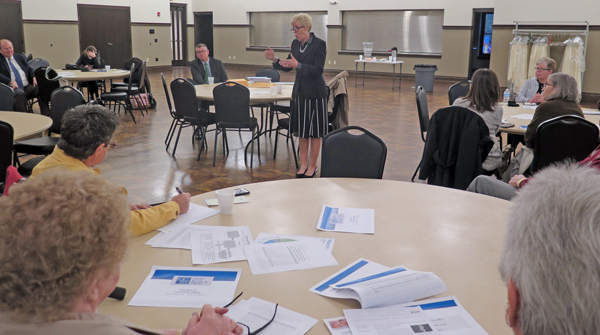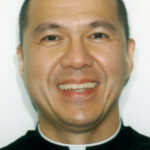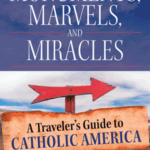
Molly O’Meara Schnell, a lawyer with Schnell & Hancock PC, speaks about estate planning at an event at Sacred Heart Cathedral in Davenport earlier this fall.
By Anne Marie Amacher
The Catholic Messenger
DAVENPORT — New tax laws for 2018 are in effect, so a presentation on estate planning and charitable contributions was offered earlier this fall at Sacred Heart Cathedral. About 25 people attended.
Presenters were Jim Tiedje, who retired as a trust officer with Quad City Bank & Trust, and Molly O’Meara Schnell, a lawyer with Schnell & Hancock PC, both members of Sacred Heart Cathedral, and Paul Schmitt, a CPA with Quad City Bank & Trust.
Schmitt noted that the standard deductions almost doubled for 2018 whether taxpayers file taxes as single, head of household or married filing jointly. Itemized deductions were also impacted. The new law retains the charitable contribution deduction, but puts limits on mortgage interest deduction, state and local tax deductions, medical and dental expenses and job and miscellaneous expenses. For some people, the standard deduction will be the best option, he noted.
He advised making a traditional IRA directly to a charity as a good option for most people. It qualifies for the required minimum distribution (RMD) once a person reaches age 70 ½. The distribution should go directly to that charity. That also lessens the income for Medicare purposes for the donor.
Another option for some who want to donate to their favorite charity is bunching donations: giving in January and December of the same year to the same charity. A third option for donations is stock or mutual funds. If facing some capital gains tax, the asset can be given to the charity. “You pay no taxes. You can do a deduction if you qualify.”
O’Meara Schnell said most people are charitable and give out of a desire to help rather than for a tax break. She advised attendees to plan not just for death, but living. Set up a will or trust, she said. Consult with your lawyer. Charitable giving is also good to do while one is living and not just upon death. Work with a financial advisor and lawyer for guidance.
When leaving money in a will or trust, leave a percent rather than a set amount, she advised, because there might not be enough money for all the charitable distributions otherwise. Heirs are not paid until charitable contributions are complete. When the will or trust is written, the amount may seem high, but less money will be available if the benefactor lives into his or her 90s.
She advised using a traditional IRA for charitable giving and also talked about power of attorney and health care power of attorney. These two documents provide specific instructions. With a power of attorney, the individual designates an agent to pay the bills and make financial decisions when the time comes. It is effective immediately unless wording is included that specifies the conditions that determine the effective date. The power of attorney ceases when the individual (not agent) dies. Power of attorney covers finances, not medical decisions.
Health care proxy or health care power of attorney makes medical decisions. Also called a living will, this document dictates what can be done or not done and is presented to the physician or hospital to show what treatments an individual may or may not want.
Tiedje said people typically have trouble getting over the hump to make financial and health care designations. “We see that we are getting older and at some point will die. But the worst decision is no decision. There are options and attorneys can help you get over that hump.”
Regarding a trust or will, O’Meara Schnell and Tiedje advised the attendees to talk with their lawyers about best options. Some people prefer a trust in order to avoid probate. No one needs a trust, but for some it is the best plan. “Your finances and who gets them are protected, timeline is faster and costs can be lower,” O’Meara Schnell said.
As the seminar concluded, Tiedje said planning for the future is part of stewardship. It’s setting up how a person wants to handle charitable contributions, understand how taxes work now and upon death, and what to do about power of attorney.











